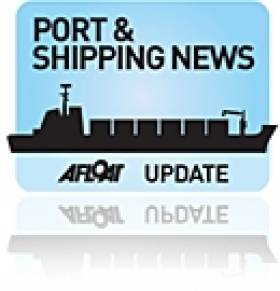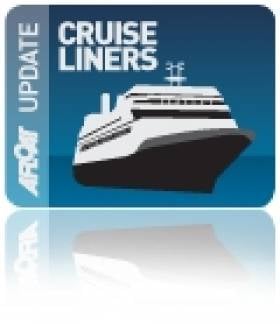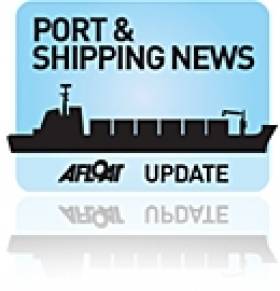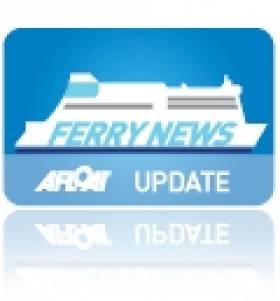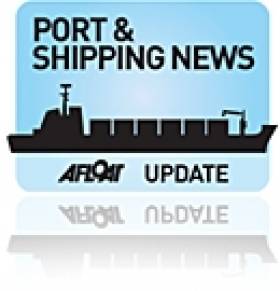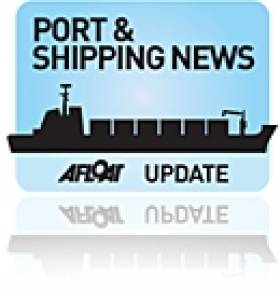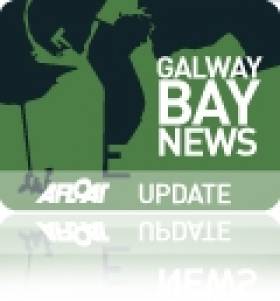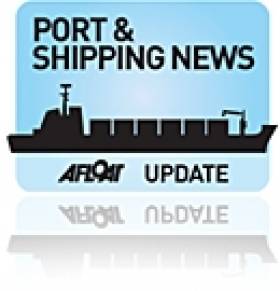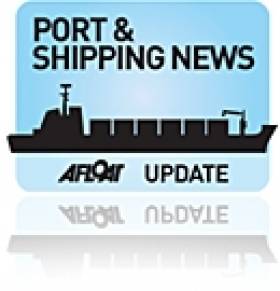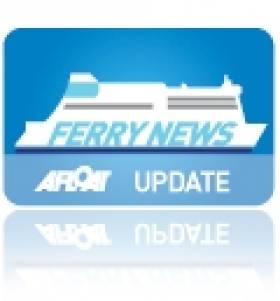Displaying items by tag: Ports & Shipping
Exports Down as Irish Ports and Shipping Volumes Fall in 2nd Quarter
#SHIPPING VOLUMES– The following is a statement issued today by Glenn Murphy, Director of the Irish Maritime Development Office (IMDO) in which he outlines the performance of ports in the republic, where ports and shipping traffic sectors declined for the second quarter of 2012.
The latest analysis of the traffic data indicates that only one of the five principal freight segments had any growth over the second quarter while all other freight segments declined compared to the same period last year.
Freight Segments:
Lift on Lift Off Lift-on/lift-off (Lo/lo) Trades were Down -5%
Container traffic (Lo/lo) declined by 5% during the second quarter of the year. Exports a subset of these figures fell by 5% in the second quarter as weaker demand conditions prevailed in major global markets. This was the first quarterly fall for exports since the beginning of 2010. Imports in this shipping segment fell by 6% in the second quarter. This represents the 18th consecutive quarters of declining import volumes as weak underlying domestic consumption prevails. The first six months of 2012, shows that imports declined by 4% while exports declined by 2%.
Roll-on/Roll-offRoll-on/Roll-off (Ro/ro) declined by -4%
Roll-on/roll-off (ro/ro) traffic declined in the Republic of Ireland by 4% in Quarter 2. The majority of Ro/Ro freight from Ireland is destined for Great Britain. The UK economy contracted between April and June with marked declines in its construction and manufacturing sectors. The first six months of 2012, shows that Ro/ro traffic declined by 3%.
Dry bulk Dry bulk volumes declined by -6%
Dry bulk volumes through Irish ports fell 6% during the second quarter of 2012 and by 3% for the first six months of 2012 with a notable fall in coal imports and aggregates, however other significant products in this sector such as animal feed and other agricultural products continued to perform well.
Tanker Tanker/Liquid bulk market increased by +28%
Liquid bulk volumes of tanker based petroleum products increased by 28% in the second quarter. This increase was primarily as a result of large volumes of crude oil being transshipped at Bantry Harbours oil storage facilities. Excluding Bantry, volumes would have seen a decline of 8% in Quarter 2, which more accurately reflects domestic demand for petroleum products.
BreakbulkBreak bulk volumes were down by -3%
Break bulk volumes continued to decline into Quarter 2, by 3 per cent with no rise in demand for construction related materials, such as timber, steel or cement. Looking at the traffic data to mid-year shows that for the first six months break bulk traffic declined by 7%.
Outlook: The outlook for the remainder of the year is flat with no significant uplift in volume demand on the key trades expected. The continued economic uncertainty globally is also having an adverse impact on International shipping markets with several leading shipping lines downgrading their volume forecasts for 2012.
Manufacturing orders across Europe also show little signs of imminent improvement as the euro zone's debt crisis threatens some of Europe's major economies.
Going forward two other caveats also need to be taken into account, firstly the weakness of the euro against most major currencies could provide some positive advantages for Irish exporting companies over the coming months, however oil prices remain at historically high levels and any further price rises are likely to have a negative impact on both transportation and production costs.
For further information about the IMDO visit: www.imdo.ie and news reports on port and shipping click HERE.
P&O Cruises Adonia Calls to Foynes
#SHANNON CRUISECALL – P&O Cruises Adonia is visiting the mid-west port of Foynes on the banks of the Shannon port today, writes Jehan Ashmore.
She had made a call to the east coast last week in Dublin Port and the 30,277 tonnes vessel is the second caller so far this year to visit the Shannon region, when the ultra-luxurious Silver Whisper docked in the Co. Limerick port in mid-May.
A further two cruise callers are scheduled, as Le Diamant is also due to call this week on Thursday. The final caller is Amadea, which is expected to close the season next month.
All cruise callers will dock in Foynes which is one of six port facilities along the Shannon Estuary which is under the control of the Shannon Foynes Port Company (SFPC).
Ports & Shipping Review: Port Trade Rise,Silver-Salvage, Ports Study, Ferries, 'Olympic' Cruiseships and New Ship
#PORTS & SHIPPING REVIEW - Over the last fortnight Jehan Ashmore has reported from the Ports & Shipping Scene which saw trade volumes in Drogheda Port continue to rise. An increase of over 44% was recorded for the first six months of 2012 compared to the same period last year.
Off the west coast, a record breaking 48 tonnes of silver bullion has been recovered from the wreck of S.S. Gairsoppa, a 412-ft British cargoship that was torpedoed by U-Boat in WWII.
The Competition Authority is to conduct an in depth review of how our ports perform and how they are to be funded and to examine whether Dublin Port has an economically dominant position.
A boost on all fronts for traffic figures on Stena Line's Belfast-Birkenhead (Liverpool) route was welcomed by the ferry operator which completed the takeover of operations from DFDS Seaways last summer.
Single-route operator Celtic Link Ferries reached an agreement with Rosslare Europort, to end a stalemate in over €100,000 relating to unpaid port landing fees.
Deutschland, one of the three cruiseships that visited Dublin Port last weekend completed its cruise in London, where the vessel is currently moored as a floating hotel for the German Olympic Sports Federation.
Belfast M.P. Nigel Dodds is leading a campaign to keep the WWI battleship cruiser HMS Caroline, the last survivor of the Battle of Jutland, from leaving the city. The 1914 built ship could be moved to Portsmouth for preservation or even face scrapping.
At the other end of the island, Cork based Irish Mainport Holdings has acquired a new seismic-support ship. The vessel renamed Mainport Kells has recently taken up a long-term charter contract for clients operating in the North Sea.
Ferry Firm and Port Reach Deal Over Fees
#FERRY NEWS – Celtic Link Ferries which operates on the Rosslare-Cherbourg route has reached an agreement with Rosslare Europort, to end a stalemate in over €100,000 relating to port landing fees. It comes after the port company recently lodged a petition in court to wind up the company over alleged unpaid bills.
The O'Flaherty brothers who own Celtic Link along with partner O'Leary International Transport Company said that the ferry firm were being overcharged in comparison with competitors Stena Line and Irish Ferries and other ports around the country.
Rosslare Europort had been demanding a landing fee of €14.92 for cars and €48 for freight vehicles, however for some time Celtic Link Ferries have been paying €3 for cars and €35 for freight vehicles, as they believed that this was approximately what their competitors were paying.
For more on this story as reported in last week's edition of the Wexford People click HERE.
Competition Authority to Examine Irish Ports
#PORTS & SHIPPING – Irish Ports are to be reviewed by an in-depth Government Plan to see how funding expansion of the nation's ports can be carried out through the private sector. The Government have ruled-out selling strategic port facilities to fund such projects.
Transport Minister Leo Varadkar said that a study by the Competition Authority into Ireland's ports would also examine whether Dublin Port had an economically dominant position. Minister Varadkar said that "Dublin Port is hugely successful with 40% of our GDP going through it."
He said that "part of our study will look at whether it is profitable because it is dominant or because it is very competitive."
Minister Varadkar said that "Dublin Port is hugely successful with 40% of our GDP going through it" and added "part of our study will look at whether it is profitable because it is dominant or because it is very competitive."
For more on this story as reported by RTE News click HERE.
Ports & Shipping Review. Cargoships, WFSVs, Cork Ferry, IMERC, Dutch Navy & Last H&W Ferry Sold
#PORTS & SHIPPING REVIEW - Over the last fortnight Jehan Ashmore reports from the shipping scene which saw a 'Pop-Up Village' delivered by cargoship to Galway Port in readiness for the Volvo Ocean Race festival which started yesterday and continues to 8 July.
Arklow Marine Services second wind-farm support vessel (WFSV) Gardian 10 was launched for UK owners and today the vessel travelled from Arklow to Belfast Port and berthed at the Abercorn Basin.
In the rebel county, efforts to revive the Cork-Swansea route took a new step when a group was formed to ascess the feasibility in re-launching the Celtic Sea link that closed last November after Fastnet Line went into examinership.
At the Taoiseach's Public Service Excellence Awards, the Irish Maritime Energy Research Centre (IMERC) based in Haulbowline, Cork Harbour, won an award which was presented by Minister for Justice Alan Shatter T.D. at a ceremony held in Dublin Castle.
Across the world the International Maritime Organisation (IMO) highlighted the Day of the Seafarer on 25 June, where the role of those who work on ships provide a vital service in transporting essential goods on a global scale to meet our needs on a daily basis.
Dublin Port welcomed a flotilla from the Royal Netherlands Navy this weekend, where two of the vessels including a torpedo-training ship HNMLS Mercuur (A 900) was open to the public.
Today the cruiseship Saga Sapphire made her maiden 'Irish' port of call to Cobh having entered service in March for UK based operator Saga Cruises. The 706-passenger capacity ship is due to dock at Dublin Port tomorrow morning.
Former North Channel ferry stalwart Stena Caledonia which operated on the Larne/Belfast-Stranraer routes since 1990 has been sold by Stena Line to ASDP Ferry of Indonesia. She is the last ever passenger ship to have been built by Harland & Wolff shipyard in Belfast.
Historic Cargo Delivered for Galway’s Grand Finale
#VESSEL VOLVO VILLAGE – Following yesterday's historic arrival of the Deo Volente, the first container ship to be unloaded in Galway Harbour which took six hours to complete concluded the delivery of logistics for the Volvo Ocean Race Grand Finale, writes Jehan Ashmore.
The cargo of containers packed with the spectator stand for the prestigious events 'Pop-Up' Village had travelled from Lisbon. But before any of this could be done the heavy-lift cargoship had to enter through the Galway's port dock gates. This was followed with the vessel making manoeuvres in the confines of the tidal basin of Dun Aengus Dock. It was a tight squeeze as the 105m long vessel edged closer to the berth in the basin which was witnessed by onlookers lining the quays.
The vessels cargo was almost the entire race village which is a travelling show that traverses the globe as part of the Volvo Ocean Race 2011-2012. It provided a "new challenge for Galway Harbour in handling containers" said Harbour Master Captain Brian Sheridan and I am delighted that the operation went better than anticipated.
After overnighting in the port, Deo Volente sailed this morning en-route to Rotterdam to pick up a cargo bound for the St. Lawrence Seaway. Currently the vessel is underway off the south-west coast.
#PORTS & SHIPPING REVIEW – Over the last fortnight Jehan Ashmore reported the shipping scene which saw former Irish President Mary Robinson on board the National Geographic Explorer . She was a guest speaker during a 'Exploring the British Isles and Irish Isles' cruise.
An order for six 40,000 dwt bulk carrier newbuildings was placed by Irish based d'Amico Dry with China's Yangfan Group. D'Amico which is a fully owned subsidiary of the d'Amico group, has made the $134m deal, which values each handymax at $22.3m.
In advance of this weekend's visit of the London Olympic torch bearing tour to Ireland, the cruiseship Braemar called to Dublin Port. The vessel which was on a scheduled cruise is to be used as accommodation ship for key workers during the games for over a month, she is to moor close to the ExCEL Centre, which is to be used for a number of Olympic events.
On the ferry front the Isle of Man Steam Packet Company chartered the Arrow, a freight-ferry to cope with the increased volume in traffic associated with the famous annually held TT Races.
Along the south-west Irish coast, the small expedition cruiseship Clipper Odyssey made an anchorage call off Sneem on the Kenmare River. The 128 passenger vessel visited Co. Kerry having sailed the short distance from Cobh the previous day.
During the same week, two vessels met off Kilronan on Inishmore, Aran Islands. They were the cruiseship Island Sky which had started a cruise from Portsmouth and the lighthouse tender ILV Granuaile (2000/2,365grt) which is based in her homeport of Dun Laoghaire.
The last of the older Dublin Port tug fleet vessels Ben Eadar set sail on a delivery voyage for new owners in Portugal. While on the far side of the Irish Sea, the port of Liverpool welcomed its first turnaround cruise call in forty years in the form of Cruise & Maritime Voyages (CMV)'s Ocean Countess. However after leaving the Mersey, she suffered a temporary loss of engine power, forcing the vessel to turn around and divert to Holyhead.
Off the sunny south-east coast, the Expedition, a former Baltic Sea ferry converted to cruiseship duties anchored off the Saltee Islands. She sports a bright red hull still retained from her ferry owners, Viking Line, which the company choosed for their first ferry Apollo. Their choice in colour was found when one of the owner's relatives produced her lipstick!
Turning the corner at Carnsore Point and up to the boatyard of Arklow Marine Services where work on their latest newbuild Gardian 10 is nearing completion. The wind farm service vessel (WFSV) is due for launch later this month.
UK Youth Trainee Vessel to Visit Dublin Port
#TRAINEE VESSEL VISIT– A small motor-training vessel the T.S. Jack Petchey based in the UK, is heading for Dublin Port today having called to Arklow, writes Jehan Ashmore.
The 24m long vessel built in 2010 is based in London. She has 16 berths which will allow her owners The Marine Society & Sea Cadets to train 16,000 young people over the next quarter century.
She is named after one of the UK's most successful businessmen, Jack Petchey who donated £1million to enable the society to build the vessel. At her commissioning ceremony she was berthed alongside Tower Bridge and St. Katharine's Docks on the Thames.
Plans for Wind-Farms Won’t Affect Manx Ferry Operator
#MANX FERRY – The IOM Today reports that the Manx Government is drawing up plans to ensure that any wind-farms built within the waters off the island would not affect ferry routes.
Work on the Isle of Man Marine Plan is under way and the Department of Environment, Food and Agriculture's director of environment Martin Hall said it was important it was completed in a 'timely manner'.
One of the plan's objectives would be to identify current activities in Manx waters and safeguard their ongoing use. Mapping the location of navigation corridors, important natural areas and pipelines/cables will enable the island to identify potential wind farm sites that will not adversely affect current uses of the Manx marine environment, including ferry routes and fishing.
The comments come following criticism from the Isle of Man Steam Packet Company over Centrica's plans for a wind farm in the Irish Sea, outside Manx waters. The Steam Packet says that Centrica plans to develop in the path of two routes: Douglas-Liverpool and Douglas-Heysham, in spite of complaints from the ferry operator. For much more on this story click HERE.



























